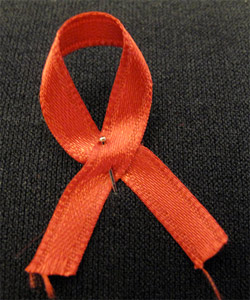 For months now, the Occupy movement has gripped the nation—and the world—with its assertion that “We are the 99 percent.” As yesterday marked World AIDS Day, I can't help but remember that both issues—the economic inequality that Occupy protesters are railing against and the disease plaguing more than a million people in the U.S.—are in fact two sides of the same coin.
For months now, the Occupy movement has gripped the nation—and the world—with its assertion that “We are the 99 percent.” As yesterday marked World AIDS Day, I can't help but remember that both issues—the economic inequality that Occupy protesters are railing against and the disease plaguing more than a million people in the U.S.—are in fact two sides of the same coin.
Income inequality has grown substantially since the 1970s. Wealth inequality has reached staggering levels. In 2009, the top five percent of U.S. households owned 63.5 percent of the nation’s private wealth. When income and wealth inequality grow to this extent, disparities in health outcomes expand as well.
Consider the HIV/AIDS epidemic in Chicago. The city's Department of Public Health (CDPH) reports that there are 20,391 people living with HIV/AIDS in the city—three times the national prevalence rate. HIV/AIDS is not simply about individual behaviors. While we rightly focus on unprotected sex and intravenous needle transmission as modes of infection, it is important to recognize that economic inequalities leave some groups more vulnerable than others. For example, in July 2010, the Centers for Disease Control and Prevention reported that although gay and bisexual men continue to represent the majority of new infections, poverty is “the single most important demographic factor associated with HIV infection among inner-city heterosexuals.” Hallmarks of poverty such as limited health care access, the targeted marketing of legal and illegal drugs in poor neighborhoods, and high incarceration rates lead to reduced utilization of HIV testing and prevention services, increased sexual risk behavior, and disruptions in the stability of relationships, respectively. Chicago grapples with all of these issues, which mark a deadly convergence of class and health that disproportionately exposes the least advantaged to the disease.
Related:
MORE POSTS BY CELESTE WATKINS-HAYES
Betwixt and Between: Middle-Class Women Living with HIV/AIDS »
Brian Babylon and Comedy as a Social Science »
Historically Black Colleges and Universities in Post-Racial America »
SEE ALSO:
The CDPH reports that HIV/AIDS reduction efforts have led to a 40 percent decrease in the number of infections since 2000. Through education, testing, and other prevention efforts, AIDS service providers in Chicago have worked to improve services and reduce stigma. My research suggests that these organizations are also playing a significant role in helping people cope with HIV and reducing new infections.
Many of those living with HIV/AIDS work on the front lines of prevention and treatment. I met Jackie, a petite African American woman in her early 40s, in 2005 while doing research on HIV positive women in Chicago. I became interested in the topic through my previous research on low-income women and clearly saw the links between economic inequality and the individual and environmental issues that increased women’s risk for HIV infection. They were living in neighborhoods that were fast becoming epicenters for high HIV rates, and the resources simply weren’t there to address the issue systematically.
Jackie asserts, “HIV will not take me out. I just do not believe that.” The daughter of a barber turned minister and a civil servant, she grew up in a lower middle class neighborhood. Diagnosed with HIV a month after the birth of her first child in 1991, Jackie describes entering a dark period of drug and alcohol abuse sparked by being given “a death sentence.” With seven years of sobriety, Jackie now has established herself as an informal mentor to several women in her Chicago community who have recently been diagnosed with HIV or who struggle with addiction. She facilitates support groups at least twice a month, frequently offering both practical advice and spiritual guidance on how to live as an HIV-positive woman. In many ways, she has reconstructed her life, focusing on her work in the city’s HIV/AIDS community, raising her 13-year-old daughter and 11-year-old son, and working as a security guard as she prepares to take classes at a local seminary.
Jackie’s story highlights the progress that has been made in helping Chicagoans cope with HIV. But we still have a ways to go. It is estimated that 20 percent of people living with HIV/AIDS don’t know their status because they haven’t been tested. And even with life-saving drugs and social services that enable people with HIV/AIDS to lead productive lives, patients’ access to resources remains vulnerable in these economic times. In our current political climate, services for those in need are often the first on the chopping block—rather than the last.
The Occupy movement challenges us to think about how all of our institutions—political, economic, and social—create an America where a majority of resources are hoarded by a privileged few. I hope Chicagoans will expand how we think about inequality to include the city's residents living with HIV/AIDS, who are more susceptible to being in the 99 percent.
Photograph: Flickr via SamwiseGamgee69


